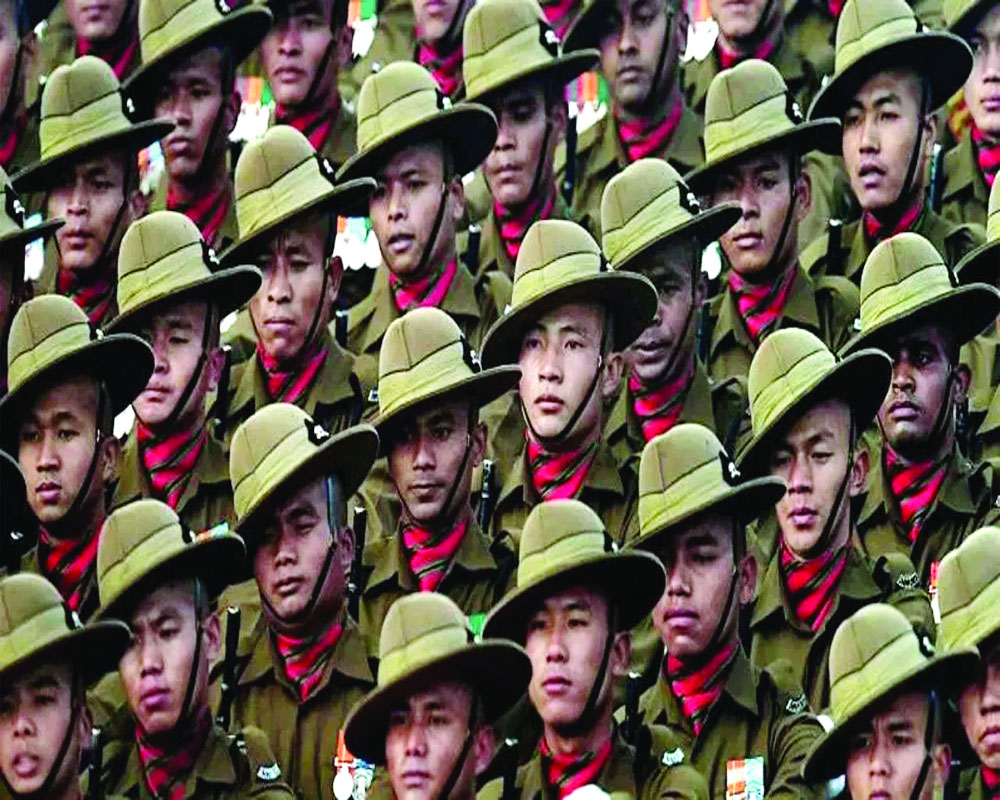The regimental system lays great emphasis on regimental affiliations. It is a colonial hangover but has paid immense dividends over the years
Winston Churchill, at the turn of the 20th Century, wrote “Regiments are not like houses. they cannot be pulled down and altered structurally to suit the convenience of the occupier or the caprice of the owner. They are more like plants; they grow slowly if they are to grow strong...and if they are blighted or transplanted, they are apt to wither.”
The Regimental System presently in vogue in our army is of colonial origin, from the days of the British Indian Army. It is for this very reason there are those, obviously lacking in any military background, who wish it to be discarded. This is despite the Indian Army, having, on Independence, made a conscious decision to retain it, given its inherent strengths and advantages for a vast and diverse country, such as ours. It is a policy that has paid immense dividends over the years and there can be no two opinions that our combat arms, the Infantry and the Mechanised Forces, continue to lay the greatest emphasis on regimental affiliations, dresses, customs and traditions.
This is because it helps instil a sense of belonging, brotherhood and continuity amongst the officers, JCOs and men in their battalions and regiments. It also helps to inculcate pride in a shared history and achievements of those who have fought before them in past campaigns. This, in turn, helps nurture the two most essential battle-winning factors, esprit-de-corps and morale, because bereft of them there can be no victory.
Unfortunately, unlike our combat elements, combat support elements do not give this factor the same kind of importance, probably because of the technical nature of their job profile. General Manoj Pande, the Army Chief, belongs to one of the combat support arms, the Corps of Engineers, being the first Chief since Independence from that corps. What is even more unfortunate, is that there are those within this Government, close to the Prime Minister, on record disparaging the regimental system and wanting it changed, which is what the Agnipath scheme does. While they may be forgiven for their views, given their lack of military knowledge and having never seen conventional combat, the same cannot be said of the military hierarchy that has quietly caved into this short-sighted initiative, whatever their justification.
What however is extremely difficult to fathom is why the military top brass, specifically Gen Pande, has felt it necessary to issue a diktat on uniformity of dresses for the ranks of Brigadiers and above, that allows for no display of their Regimental/Corps accoutrements which reflect regimental affiliations. These orders are an admission that regimental affiliations, more than reflecting pride and belonging in one’s regiment or corps are instead influencing promotions. While that would certainly be true in some cases, human nature being what it is, his hypothesis does a great disservice to the selection process in place that has stood the test of time. Would it not have been better to take corrective action to make the selection system more responsive, rather than indulging in changing the dress code put in place in the early Seventies to enhance bonds between senior officers and the rank and file that is increasingly under strain? In any case not displaying Regimental affiliations does not make an individual anonymous. For that matter, does this not cast a shadow on the credibility of their promotions?
However, even if we were to give them the benefit of the doubt and accept their contention, orders denying officers who have served with the elite airborne forces the right to wear the maroon beret is illogical, poorly thought out and utterly condemnable. Maroon berets are the accepted headgear of all airborne forces universally. Our forces have been wearing this since 1941 when the Parachute Brigade was first raised. Incidentally, the 50th Independent Parachute Brigade has the record of being the oldest formation worldwide that has continuously remained in the airborne role to date. This is a source of great pride for all its members and is reflected in the high standards of professionalism, elan and esprit de corps that is on display. More importantly, the maroon beret does not reflect any particular arm or service, as volunteers from any arm, corps or service are eligible to serve in one of our Special Operations Forces units, provided he or she has successfully undergone the extremely tough selection process that is in place.
In effect, the earning of the maroon beret is a hard-earned qualification and a clear reflection of an individual’s abilities and a source of immense pride. Thus, to be deprived of the right to wear the maroon beret after having earned it is unjust, unreasonable and smacks of bias and even jealousy. After all, what impression does the Commander of the Parachute Brigade convey to his troops, if only he among them, is barred from wearing the maroon beret which he has also earned and worn till he was promoted? Indeed, it seems a bigoted and bizarre order, and its adverse impact on morale and esprit-de-corps can be easily appreciated, and the military hierarchy would do well to reconsider this flawed order.
(The columnist, a military veteran and former paratrooper is presently a Visiting Fellow with the Observer Research Foundation and a Senior Visiting Fellow with the Peninsula Foundation, Chennai)
























